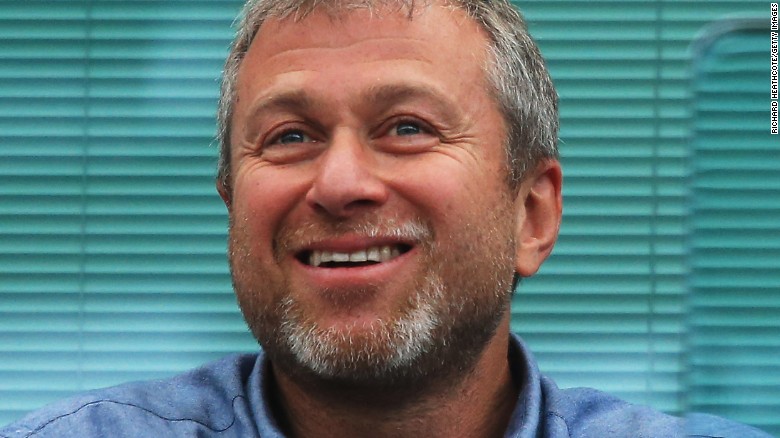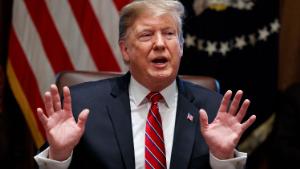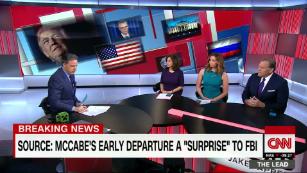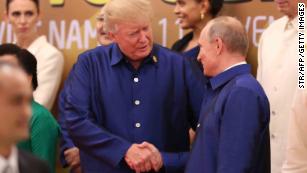-
US names Russian oligarchs in 'Putin list' but imposes no new sanctions
Washington (CNN)The US has released a sweeping list of prominent Russian business and political figures, in defiance of Moscow and implementing a Congressional law designed to punish Russia for election meddling.The US Treasury report, published shortly before a midnight deadline, listed every senior member of the political administration at the Kremlin, and every Russian oligarch with a net worth of $1 billion or more.Some of those named are already subject to US sanctions. But the administration stopped short of imposing any new punishments, saying the legislation was already doing its job. The report was "not a sanctions list," it said.Instead, the Treasury report resembled an exercise in naming and shaming -- putting individuals on notice that they may be subject to sanctions in the future.The list includes:- 114 senior political figures with close ties to Russian President Vladimir Putin, including his chief spokesman, Dimitry Peskov, Foreign Minister Sergey Lavrov and Prime Minister Dimitry Medvedev.
- 96 oligarchs with a net worth of $1 billion or more, including the aluminum magnate Oleg Deripaska, Chelsea football club owner Roman Abramovich and the media and tech magnate Alisher Usmanov.
- The Treasury said the list was "based on objective criteria drawn from publicly available sources." The oligarchs' names matched exactly a list of 96 Russian billionaires compiled by Forbes magazine last year.
 Russian businessman and Chelsea football club owner Roman Abramovich.
Russian businessman and Chelsea football club owner Roman Abramovich.Kremlin criticizes US over list
Addressing supporters in Moscow on Tuesday, Russian President Vladimir Putin said that although he hadn't yet seen the list, the sheer number of top officials included on it was tantamount to a US condemnation of the whole country."What's the point of this? I don't understand," Putin said. "But this is of course an unfriendly act. It complicates already complicated Russia-US relations and harms international relations in general. Those who engage in this are basically engaged in their own domestic politics. They are trying to attack their elected president."However, he added that "we have heard about some other secret list, containing other names, so we need to look and see what is going to happen."Aleksey Chepa, deputy chairman of the State Duma's international affairs committee, described the release of the list as "another step, which, obviously, leads to further escalation of tensions," reported news agency RIA Novosti.Konstantin Kosachev, chairman of the foreign affairs committee in the Federation Council, the upper house of the Russian parliament, said the US had merely "copied out the Kremlin phonebook" in its attempts to prove it had "dirt" on Russian elites.Leading business figures in Moscow were reported to have been anxiously awaiting the report, dubbed the "Putin list." They feared that even if it did not impose further sanctions, it would have a chilling effect on their businesses.But critics of the Trump administration in the US were furious that it did not take the opportunity to ratchet up measures on Russia.Why was the list published?
The Trump administration was required to publish the list by the Countering America's Adversaries Through Sanctions Act (CAASTA), which was meant to punish Russia for its interference in the 2016 US election, as well as alleged human rights violations, the annexation of Crimea and ongoing military operations in eastern Ukraine.It was supported by Democrats and Republicans who wanted to try and prevent President Trump from watering down US sanctions on Russia. The President described it as "seriously flawed" when he signed it into law in August.Earlier Monday, the Trump administration declined to impose sanctions against companies and foreign countries doing business with blacklisted Russian defense and intelligence entities, a consideration required by CAASTA."Sanctions on specific entities or individuals will not need to be imposed because the legislation is, in fact, serving as a deterrent," a State Department official said.State Department spokeswoman Heather Nauert said the legislation had already deterred Russian defense sales. "Since the enactment of the CAATSA legislation, we estimate that foreign governments have abandoned planned or announced purchases of several billion dollars in Russian defense acquisitions," she said in a statement.The agency noted that it also provided an additional classified report to Congress that may have included other individuals not listed in the public portion.Secretary of State Rex Tillerson signed off on the report Monday morning, CNN understands.The reports were released on a day when the ongoing FBI investigation into President Donald Trump's potential campaign ties to Moscow during the 2016 election once again dominated the news, and once again raised questions about policy decisions his administration is making on Russia.FBI Deputy Director Andrew McCabe, long the target of Trump's ire toward the FBI over its investigation into possible collusion between his campaign and Russia, stepped down in a surprise move Monday. Trump's allies have recently intensified their campaign against the investigation, alleging FBI abuses of a surveillance law.What has the reaction been?
Critics of the Trump administration were outraged."I'm fed up waiting for this administration to protect our country and our elections," Rep. Eliot Engel, the ranking Democrat on the House Foreign Affairs Committee, said in a statement. "They've now shown us they won't act, so it's time for Congress to do more.""The Trump administration had a decision to make whether they would follow the law and crack down on those responsible for attacking American democracy in 2016," Engel said. "They chose instead to let Russia off the hook yet again."Sen. Ben Cardin of Maryland, the ranking Democrat on the Senate Foreign Relations Committee, was more measured, thanking the administration for engaging with Congress. But he added: "The US should be prepared to impose sanctions when the law is clearly violated," Cardin said. "The administration should not rest in these efforts and I expect a frequent and regular dialogue on this issue."Moscow had warned the US not go ahead with publication. Kremlin spokesman Dmitry Peskov said it was "a direct and obvious attempt" by the US to interfere in Russia's upcoming presidential vote in March.Alex Brideau, director of the program covering Russia, Eurasia and Ukraine at the Eurasia Group, said wealthy Russians were worried about the impact of the report. "Wealthy Russians are reported to be lobbying heavily in Washington, seeking legal advice regarding their foreign investments and trying to distance themselves from the Kremlin," Brideau said in a report before the US list was published .What's the background?
CAASTA was one of the first pieces of major legislation that Congress sent to Trump, who has refused to acknowledge fully Russia's interference in the 2016 US elections and has cast doubt on the consensus opinion of US intelligence agencies that Moscow did so.The act passed with broad bipartisan support, clearing the Senate by 98-2, though Trump signed it into law reluctantly. Among other things, the law limits the President's ability to remove sanctions on Russia without lawmakers' approval. It also set two deadlines.After the first missed deadline on October 1, Secretary of State Rex Tillerson came under sharp criticism from lawmakers from both parties, who questioned why the Trump administration was almost a month late in meeting the deadline and whether the delay reflected reluctance from the White House to further sanction Moscow.In an unclassified letter Monday to Rep. Ed Royce, the California Republican who's the chairman of the House Foreign Affairs Committee, Tillerson wrote that he had instructed "all diplomatic posts" to reach out to their host nations and make "clear that we intended to robustly implement the law, that transactions determined to be significant were sanctionable, and that we would re-engage where necessary with more specific outreach."Editor's note: The story has been updated to include the US Treasury Department list and Russian reaction.CNN's Nicole Gaouette contributed to this report
To the best of my ability I write about my experience of the Universe Past, Present and Future
Top 10 Posts This Month
- Here Are the New Members of Donald Trump’s Administration So Far
- Trump and Musk unleash a new kind of chaos on Washington
- Greenland's leader says "we are not for sale" after Trump suggests U.S. takeover
- Crowdsourcing - Wikipedia
- The state of the Arctic: High temperatures, melting ice, fires and unprecedented emissions
- Thousands of Jews have left Israel since the October 7 attacks
- The AI Translated this about Drone Sightings in Europe from German to English for me
- Philosophic Inquiry is nothing more than asking questions and looking for real (Not imagined) answers
- "There is nothing so good that no bad may come of it and nothing so bad that no good may come of it": Descartes
- reprint of: Friday, March 18, 2016 More regarding "As Drones Evolve"
Subscribe to:
Post Comments (Atom)














No comments:
Post a Comment